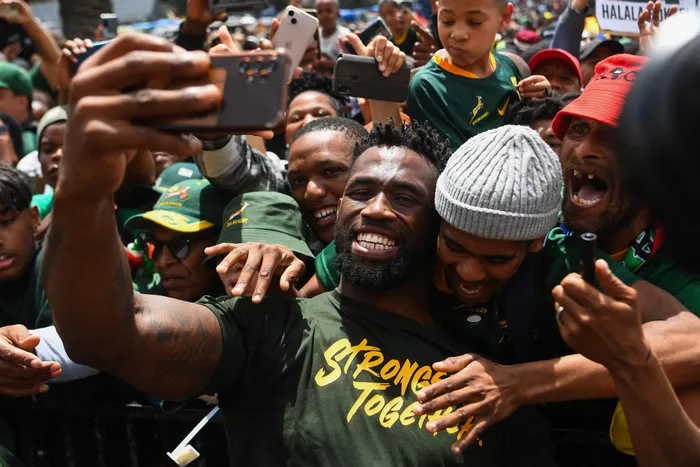From Paris to Perth: Springboks show no signs of 'babelas' ahead of next Rugby World Cup
TACKLING GOLIATH

Springboks captain Siya Kolisi celebrates with the fans during their Trophy Tour following their 2023 Rugby World Cup in.
Image: AFP
Two years ago today, most South Africans woke up with massive babelas. Some may not even have slept.
Leftover braai and a beer was the breakfast of choice as they made their way back to the scene of the crime — the living room — where many also left their voices and their dignity behind.
For, on the night before, far away on a crisp evening in Paris, the Springboks completed a feat of sporting willpower to secure back-to-back Rugby World Cup titles by defeating the All Blacks in a dramatic and brutal final. It was another one-point win — their third in succession — that put the nation’s collective nerves in a state.
But the euphoria that followed swept the length and breadth of the country. From Soweto to Stellenbosch, the braai fires sparked one of the biggest parties South Africa has ever seen.
The Springboks’ victory on October 28, 2023 was the culmination of a four-year cycle built on tactical genius, unparalleled physicality, and the iron will of a cohesive squad.
Today, however, the champagne glasses have long been emptied, the confetti swept away, and the focus has shifted to the monumental challenge of a three-peat in Australia in 2027.
The Springboks’ current state of play is defined by a necessary and inevitable transition. The 2023 World Cup was won by a team built on the platform laid by the 2019 triumph in Japan — a golden generation that will go down as one of the greatest international sides the game has ever seen.
Many of those players were at the peak of their powers in France, but now the age profile of the squad is the biggest strategic hurdle facing Rassie Erasmus and his management team.
Over the past two years, the immediate challenge for Erasmus has been managing the post-World Cup shake-up. The Erasmus–Jacques Nienaber partnership was one of the most successful in Springbok history.
Between 2018 and 2023, they transformed South Africa from a side in crisis into back-to-back world champions. Their formula, built on discipline, physical dominance, and tactical precision, proved almost impossible to dismantle.
Since Nienaber’s move to Leinster, Erasmus has resumed full control, overseeing evolution rather than revolution. His challenge has been balancing continuity with regeneration. Veterans such as Siya Kolisi, Eben Etzebeth, Handré Pollard and Pieter-Steph du Toit remain central figures, but Erasmus knows the next cycle demands fresh energy.
If the 2023 champions were powered by experience, the 2027 contenders will be defined by transition. Young players are stepping into leadership roles, and some are already showing they can shoulder the weight of expectation.
In the forwards, Jasper Wiese has seamlessly replaced the retired Duane Vermeulen at No 8. Behind the scrum, new heroes such as Sacha Feinberg-Mngomezulu are starting to emerge, injecting pace and variety into the Bok backline.
If there’s been a quiet shift since 2023, it’s in the Boks’ attacking approach. While their power game and set-piece mastery remain central, Erasmus has encouraged more ball-in-hand ambition. The balance between structure and spontaneity is slowly tilting.
They’re still pragmatic, but less predictable, more willing to strike early rather than grind opponents down.
This evolution, though, isn’t cosmetic; it’s strategic. The wide, dry fields of Australia will demand quicker transitions and greater attacking flexibility. Erasmus knows that to win a third straight title, the Boks can’t just overpower the world, they’ll need to outthink it.
Beyond tactics, South Africa’s greatest strength remains psychological. That mental edge has carried through into this new cycle. Even as younger players earn caps, the culture of accountability and belief remains intact.
As the build-up to Australia 2027 gathers pace, the Boks’ task is twofold: to stay ahead tactically and to manage the generational handover without losing their edge. With Erasmus at the helm, the Springboks remain the gold standard — a team others measure themselves against.
Two years removed from France, and two years away from Australia, the Springboks aren’t just defending champions, they’re architects of a rugby dynasty. And if history is any guide, their story is far from finished.
A fifth title in 2027 isn’t just possible — it’s plausible. Because when it comes to the Springboks, greatness isn’t a phase. It’s becoming a pattern.
Related Topics: